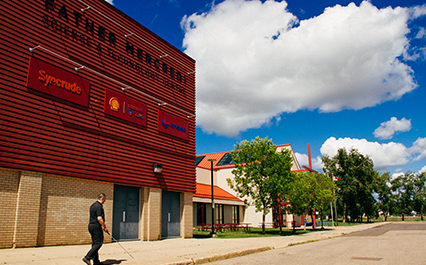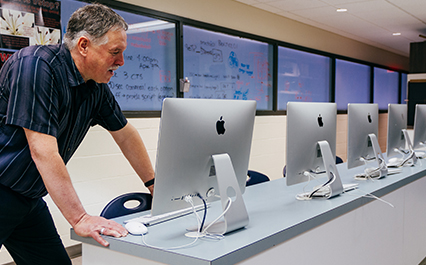Page Content

Tim Kilburn overcomes disability to
inspire generations of students
Tim Kilburn has an excellent memory.
Phone numbers, passwords, locations of vital equipment, potential tripping hazards — they’re all in
his head.
Kilburn is blind, so his memory is his backstop in life. Plus, researching information takes time that he would rather use elsewhere. The result: students and some fellow teachers actually think he knows everything, and many describe him as a genius.
“Don’t ever give me your credit card number,”
Kilburn jokes.
Kilburn, however, prefers to think of himself simply as a teacher, a calling he came to after high school.
“I went to university to get a degree with no real thought as to what I was going to do. I was doing well in mathematics when I wondered if teaching was for me.”
Kilburn switched over to education and liked that there was an emphasis on well-educated teachers, and he liked the opportunities that teaching offered.
“I knew I would never be a fighter pilot or a truck driver, but apart from that, I wanted a career with no limits. Teaching has given that to me.”
Kilburn has been with Fort McMurray Catholic schools for more than 30 years. He taught math and various versions of computing courses for 20 of those years before jumping at an exciting opportunity the school offered him to help create an in-house science
and technology centre in partnership with local industry and post-secondary institutions. Today his classroom involvement is limited to supporting CTS teachers and the Safestart safety training program.
Still, he considers himself a teacher.
“I’m not a blind teacher. I’m just a teacher who happens to be blind,” he says.
Kilburn allows no pandering because his sensory world is different, but he is aware that he’s viewed as an example due to his attitude, work ethic and knowledge. He is a computer whiz and he astonishes people with his keyboarding speed, seemingly limitless knowledge and ability to solve glitches.
“The students know and understand that I have a disability but that I do my best to not let these limitations stop me from achieving my goals,” he says. “My desire is for the students to meet their own challenges, whether physical or intellectual, with the same hopefulness.”
While he was a classroom teacher, rumours of
Kilburn’s “spidey sense” became legendary in the school. That’s because of the ESP thing that he would do.
Every year in his classroom there was always a joker whose favourite trick was to sneak up and try to pet Kilburn’s service dog. Always aware that this was happening, Kilburn would wait until the last possible moment before intervening.
“Don’t try to pat the dog; he’s working.”
Sarah Wanner, now a fellow teacher, was a
student in Kilburn’s class in 2001.
“I remember there was one boy who always tried that trick. He never even came close. Tim always knew and always sent him back.”
Kilburn’s example is one of the reasons that
Wanner became a teacher.
“He’s always fixing everyone’s problems at the school. He knows everything, gets on with everyone, has a wonderful sense of humour,” she said. “To see what he could do in class was inspiring.”
Former student Josh Moores remembers Kilburn’s skills (“fastest keyboard typing I ever saw”) and
his empathy.
“Mr. Kilburn really connected with the students. He was so impressive, but also so caring,” Moores said. “Just watching him in the classroom was a
lesson in itself. It wasn’t as if he was as good as anyone else. He was better.”
For Kilburn, teaching is about reaching out to students and showing them the way.
“Building relationships is a key part of being a successful teacher,” he says. “Treating the students with respect, having an appropriate sense of humour, being passionate and knowledgeable about your subject matter, being approachable both for students and staff alike, and modelling a love
of learning.”

GETTING TECHNICAL WITH
Tim Kilburn
What can you tell us about your vision loss and how it has impacted your life?
As a child, I used the little vision I had the best that I could, which is totally normal in those who experience sight loss. As I grew older and my vision gradually worsened, I accepted and naturally adapted to the changes. It is just part of me and I need to work with what I have.
How has your vision affected your ability to learn and teach?
My low vision/blindness created challenges with respect to learning and acquiring certain skills. I believe that these experiences helped me to be a better teacher through the need to develop varied approaches to learning and incorporating these when working with students.
How did you become interested in technology?
In Grade 12 I took my first computer science course—programming in the Fortran language. I believe that this helped spark the fire, and I continued taking more computer science courses while getting my B.Ed.
|
Got an idea? In Profile features an interesting teacher in each issue of the ATA Magazine. If you know of a teacher who would be a good profile subject, please contact managing editor Cory Hare at cory.hare@ata.ab.ca.
FATHER PATRICK MERCREDI SCIENCE AND TECHNOLOGY CENTRE
In 2010, Tim Kilburn was offered a project that most teachers could only dream about. The idea was to build five high-tech lab spaces within Father Patrick Mercredi High School. Conceived as a partnership with local industry and post-secondary institutions, the spaces were dedicated to engineering, industrial technologies, health sciences, information technologies and multimedia. Kilburn’s job was to make the dream a reality. He did.
As one of the two project leads (along with colleague Deborah Kitching), Kilburn’s responsibilities included fundraising, program design, planning and implementing school renovations, acquiring specialized equipment, aligning the programs with the CTS curriculum and staff development.
The new facility opened in Sept. 2011 and enables students to experience hands-on, practical learning and subsequently make informed career decisions.
Kilburn’s ongoing role is as a technology consultant.
“The equipment and technology is impressive,” he says, “but it’s the teachers that make the programs engaging
and successful.”
